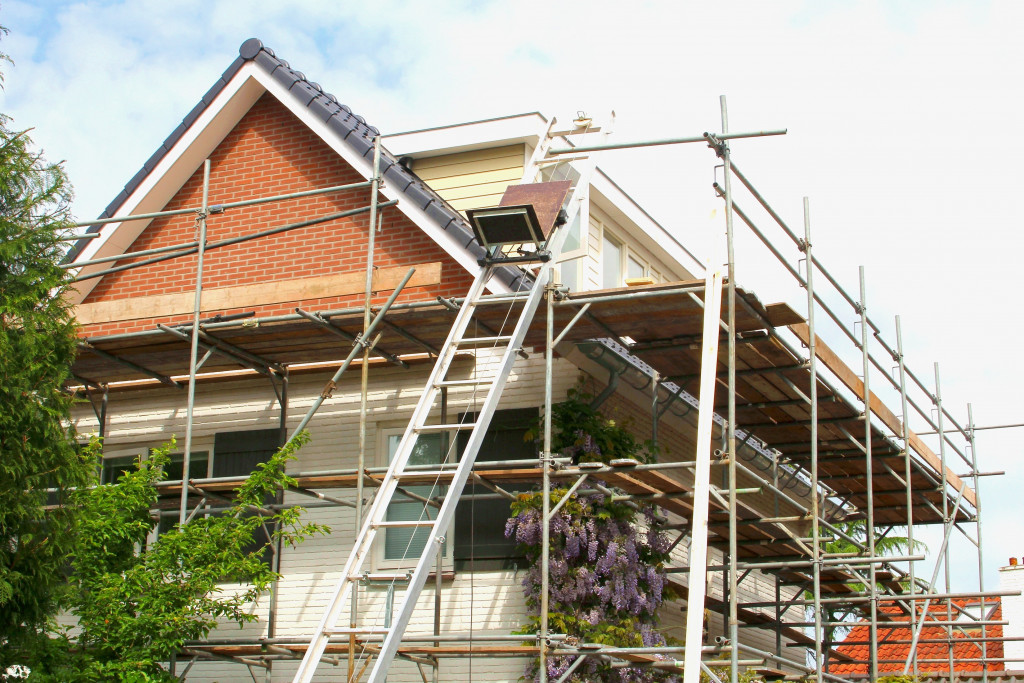Homes in the United States are made with high standards. As a result, most houses can easily last for over a hundred years with the proper maintenance. But, as many homeowners know, everything starts to show its age after a while.
That’s where renovations come in! A fresh coat of paint, new floors, or an updated kitchen can make a huge difference in how you feel about your home. However, renovating a home can be a daunting task. It can also be expensive, costing around $47,000, depending on the nature of the renovation. But if you take the time to prepare for it, you’ll be much better off. Here are five things to do before renovating your home.
Get a Loan
Start the process as early as possible if you plan to take out a loan to finance your renovation. Getting approved for a loan can take weeks or even months, and you don’t want to be stuck in the middle of a renovation with no money to finish it.
There are a variety of loans you can get to finance your renovation. Here are a few:
- Home Improvement Loan: A home improvement loan is specifically for renovations. It usually has a lower interest rate than other types of loans, and the terms are often longer, making it easier to repay. You should get this loan if you need to renovate.
- Home Equity Loan: This loan is based on the equity you have in your home. The amount you can borrow is usually based on the percentage of your home’s value that you own. You can use the loan for anything, including renovations.
- Personal Loan: A loan from a bank or other financial institution that isn’t backed by your home equity. The loan usually has a lower interest rate than a home equity loan but is much higher than a home improvement loan.
- Credit Card: If you have good credit, you may be able to use a credit card to finance your renovation. This option should be a last resort, as credit card interest rates can be very high.
No matter which type of loan you choose, make sure you shop around for the best deal. There are many lenders out there, each offering different terms and interest rates. Don’t settle for the first offer you receive — take the time to compare them and find the one that’s right for you. Also, remember to never get multiple loans at once. Diversifying your loan can lead to disasters, so it might be better to get one big loan instead of several smaller ones.
Get Your Home Inspected
You might think you know everything there is to know about your home, but there’s a chance you’re wrong. A professional home inspector can identify potential problems you may not have noticed. These problems could be anything from a minor issue that you can quickly fix to a significant structural problem that will cost a lot of money to repair.

The inspector will also check for things that need to be updated, like old wiring or plumbing. It’s better to know about these things before you start renovating, as they can be expensive to fix.
Getting an inspection is a good idea if you plan to sell your home shortly. It will help you identify any issues that potential buyers might find off-putting.
It’s also good to get a drone inspection if you can. An in-depth drone roof leak inspection service can make a difference in your renovation, especially if you’re in a storm-prone area. Some inspectors can miss roof leakages, while drones can’t. Along the way, the drone can check whether your roof is up to date or not.
You can usually find a home inspector by searching online or on the yellow pages. The cost of an inspection varies, but it’s typically around $380.
Get Multiple Bids
Don’t just go with the first contractor you find. Instead, get at least three bids from different contractors to compare prices and services. Ensure you’re clear about what is and is not included in each bid. Once you’ve chosen a contractor, get everything in writing before any work begins.
This written agreement should include the scope of work, a schedule of when the work will be completed, and the project’s total cost. It’s essential to have everything in writing, so there are no misunderstandings later.
You should also make sure your contractor is adequately licensed and insured. Ask to see their license and insurance paperwork before you hire them.
Get Your Home Insured
If planning a significant renovation, you must ensure your home is properly insured. Otherwise, you could be left with a huge bill if something goes wrong.
Most homeowners insurance policies cover damage caused by fire, wind, hail, and lightning. But they often exclude damage caused by water, floods, and earthquakes. So if you live in an area where these disasters are common, you’ll need to purchase separate insurance policies to be fully protected.
Renovating your home can be a daunting task. But by following these five simple steps, you can make the process much easier — and less expensive. So what are you waiting for? Start planning your renovation today!

